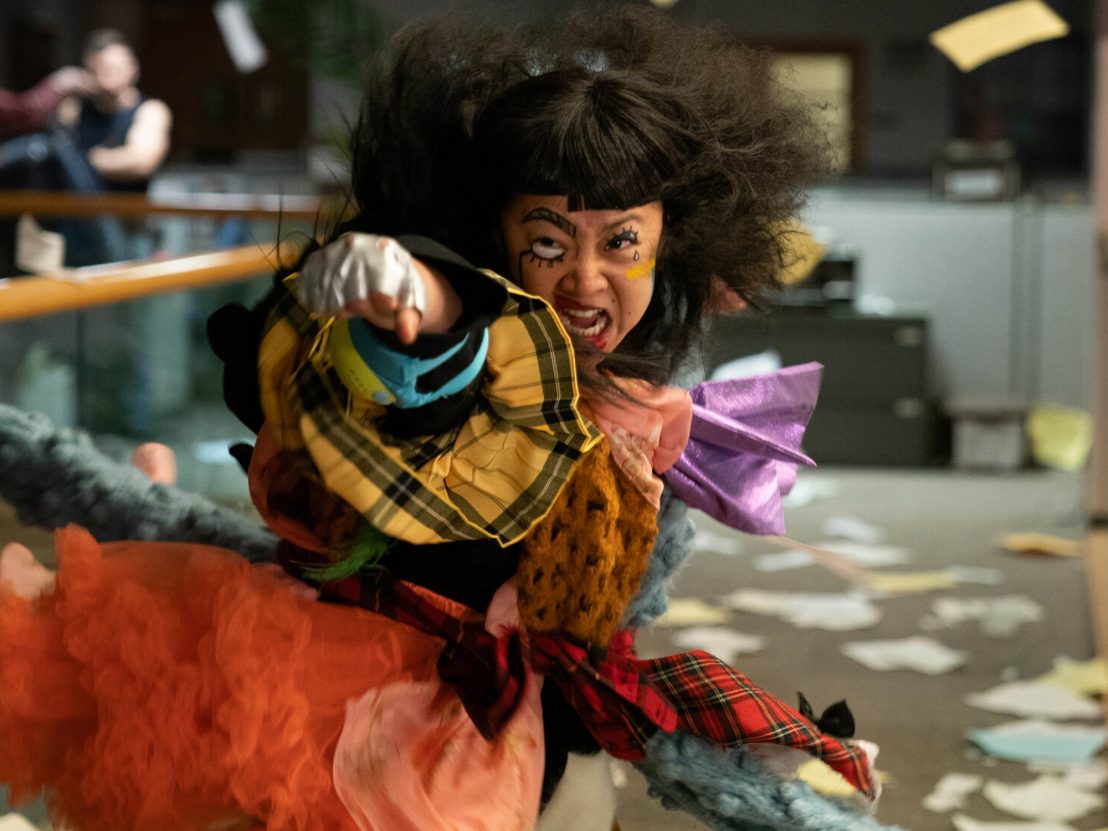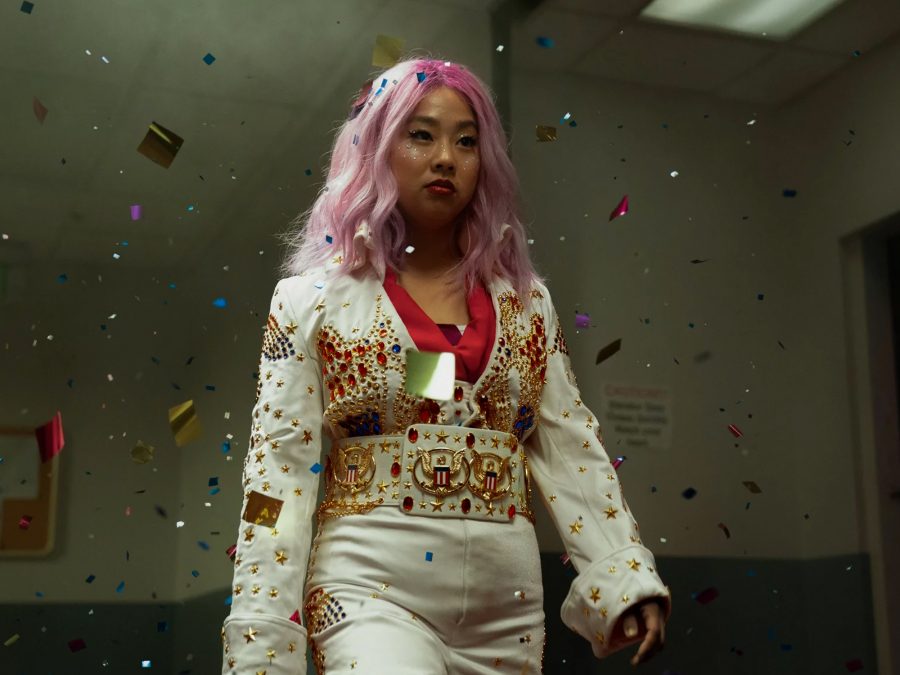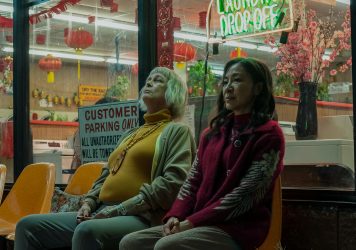
In a new series, we’re celebrating the films we loved that aren’t likely to dominate the awards race. Over the new few weeks, our writers make passionate arguments for the performances and craft that stood out to them, from blockbusters to arthouse and everything in between.
To be the child of immigrants is to be famously in between. In between cultures, in between languages, in between histories; a wary tourist in your own home, none of which truly belong to you or – more precisely – you to them. Words turn clumsy in your mouth, other people’s families seem incomprehensible in their ease, and your whole life can feel uncanny – a world that is too close and unknown all at once. It is a state of discomforting liminality; a seat on the hard chair of the waiting room, always, but not quite, preparing to depart.
In Everything Everywhere All At Once, Stephanie Hsu’s Joy is everywhere, which is to say nowhere. Daniel Kwan and Daniel Scheinert’s gleefully manic, tangled take on the American Dream, about a Chinese immigrant family caught in the ravages of the multiverse and their own failed hopes, sees the relative newcomer take on two roles – or the same role shattered and warped through space and time beyond recognition. She is Joy, the sarcastic, defensive, and deeply hurt daughter of Evelyn and Waymond, and she is Jobu Topaki, a version of Joy who was once pushed too far by her mother’s expectations several universes away, and whose irresistibly flamboyant brand of nihilism is taking over the multiverse.
Snared in the ever-widening space between her Chinese parents Evelyn (Michelle Yeoh) and Waymond (Ke Huy Quan), and her American girlfriend Becky, Joy inhabits that quintessential in-between that defines the second generation: in between cultures, generations, narratives – both damsel-in-distress and villain. Shedding identities and universes like a snakeskin, Jobu Topaki morphs from Joy’s disillusioned grunge to bubblegum TikTok looks – lipstick hearts on her cheeks, glitter around her angry eyes – desperate to leave her pain behind.
How can an actor play a character that is everything and nothing? Hsu understands that the key is precision even amidst chaos. Transfiguring the emotional gap that exists between Joy and her parents into technicolour carnage, Hsu makes Joy and her darkest timeline counterpart Jobu Topaki a study on the corrosive nature of disappointment, and the ways in which such gutting loss – like its showier emotional peers – can play out wide and big. It is a near impossible feat, to perform the very idea of performance as elision, as a mask for a deeply fractured core.
“She has no real motives or desires,” the Alphaverse’s Waymond warns a bewildered Evelyn of the creature she is about to encounter, but Hsu’s embodiment of the characters she tangles together is so mesmerising precisely because it understands the untruth of this statement, illuminating the unquenched desire for acceptance that lies beneath Jobu Topaki’s incarnate cynicism.

It is a desire legible in the slow downturn of her mouth as she watches the realisation of the chaos she has sown as Evelyn finally breaks down at the family laundromat, in the hoarse sob in her voice as she struggles out of Evelyn’s arms, bent on her own self-destruction. There is a plasticity to Hsu’s face that can so adeptly rearrange itself from relish to grief, that contains so much: all the anger, frustration and desperation that has crystallised into Jobu Topaki, everything that might fit on a bagel before it collapses from the sheer weight of such unmet desires.
Jobu Topaki looms large, both for Evelyn and for the audience, but at her centre, and at the centre of Hsu’s performance, is Joy, her mouth strained as she sits in the minivan with her mother, her face crumpled as Evelyn, over and over, denies the complexity of her daughter’s personhood – her queerness and stubbornness and right to mediocrity. These flashes of Joy sting in their rareness; throughout the film, Joy is the key to the interdimensional puzzle that remains elusive, buried under too many layers of disaffection and distance to keep herself safe.
Take the very first time we see her on screen, celebrating with her family in another, smaller screen reflected in Evelyn’s office. She is not entirely real – a figment of an imagination, or of another world. Much like fellow awards contender Aftersun, Everything Everywhere All At Once is a film that frequently takes place in surfaces and mirrors, in dreamed of and often startling alternative realities. Yet in almost every ludicrous permutation of the universe, the real Joy, the third member of the Wang family, is nowhere to be found. Jobu Topaki is vivid, unflinchingly present, but she is not Joy. There is an astonishing sensitivity that Hsu extends to both the gap and collapse that exists between the two doppelgangers, to the ways in which she peels back Jobu Topaki’s rainbow tulle and pop art face paint to reveal Joy, sheltering in place amidst the chaos until she can finally find where she might belong.
In a film saturated with career-defining performances, Hsu’s ability to stand out is nothing short of astonishing, and it’s heartening to see her break through into the Academy Awards’ Best Supporting Actress category (Hsu is only the third actor of Chinese descent to be nominated in the Academy’s history). Only a mad person, so the saying goes, would repeat the same action over and over again expecting different results and by the same stroke, perhaps only a fool looks to the awards industry after its lengthy history of Being Wrong expecting any real reflection of merit. But hers is one of the great supporting performances of recent times, simultaneously outrageous and restrained – a carefully crafted portrait of the detritus left behind by the dislocating machinations of family and the American Dream.
Published 12 Mar 2023

By Weiting Liu
A Chinese-American family’s lives are changed forever across multiple universes in Daniels’ ambitious second feature.

By Ryan Coleman
The Belgian actress has been quietly building a body of excellent work, defined by her empathetic portrayals of multifaceted women.

By Ella Kemp
His turn as the vapid, insecure David in Bodies Bodies Bodies proves there's more to Davidson than tabloid headlines and Saturday Night Live skits.